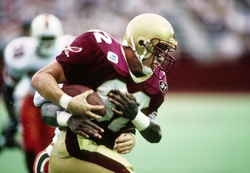We are nearly a month away from the 2014 NFL Draft and we are already running full speed steam ahead regarding pre-draft visits and which team will be drafting what position and who. As such, a lot of the rampant media attention from NFL Network, ESPN, and other sports news outlets will be primarily centered around 1st Round selections and maybe 2nd Round prospects at best.
“Then in the third round, you see guys who are maybe better football players than a lot of guys in the second round, but maybe not as maybe overall talented, in terms of measurements.” – Bill Belichick from Michael Holley’s War Room
This article will be focused on why certain draft prospects whom usually have 1st or 2nd Round talent tend to take a tumble down team draft boards and fall, providing value for NFL teams in the middle rounds, usually the 3rd to 5th Rounds.
Number 4: Scheme Fit
This is rather obvious, especially for comparing teams that have differing blocking schemes such as Man vs. Zone or when comparing defenses where a team may opt for larger sized LBs for their hybrid 3-4 compared to a 4-3 team desiring smaller, faster LBs such as Lovie Smith in Tampa Bay for his Tampa 2 defense. This is most perceptive when teams are making requests of collegiate players to transition to new roles at the NFL level, most commonly undersized Defensive Ends who may only weigh 250-260 pounds switching to Outside Linebacker or more rarely as the case with Tedy Bruschi, to Middle Linebacker.

Credit to http://www.azstarnet.com
Despite 52 Sacks in his college career, Bruschi fell mostly because he was a tweener whom was too small to be a Defensive End and would need to change his position at the NFL Level. Ray Lewis was an animal but fell to the 26th pick in part because he was deemed too short at 6’0, this despite finishing 5th all-time at Miami in tackles while only playing 3 Seasons.
WR DeSean Jackson was considered too slight after weighing in at 169 pounds and teams worried about whether he could handle punishment if asked to routinely make catches over the middle of the field. He fell to the 49th pick, selected by the Philadelphia Eagles and became a good fit for their downfield vertical passing scheme under Andy Reid.
This can also be the cause behind players who are considered too short at the Quarterback position switching to Wide Receiver (or in 2014 Prospect Jerick McKinnon’s case, to RB): Hines Ward was a 3rd Rounder, Josh Cribbs went undrafted, Julian Edelman was a 7th Rounder, and Armanti Edwards was a 3rd Rounder.
Number 3: Character Concerns
Usually character concerns can immediately knock a prospect completely off a team’s draft board or, at the very least, send them tumbling down to the middle or even lower rounds. Sometimes they are warranted such as in the cases of RB Lawrence Phillips or DT Christian Peter, whom was cut a week after the 1996 NFL Draft due to his violent background from college whilst being a 5th Round Selection.
Other times they may not be as warranted such as RB Corey Dillon, whom fell to the 43rd pick of the 1997 NFL Draft due to concerns over his attitude on & off the field but proved to be a reliable player, despite the lack of winning success in Cincinnati.
WR Terrell Owens, despite his obvious talent on the field, fell to the 3rd Round partly over concerns about his coachability in college and the fact that he came from a small school in Tennessee-Chattanooga.
Number 2: Underachieved in College
This is probably the biggest factor in terms of sending a prospect tumbling down a board, the dreaded underachiever tag. This may simply be due to dealing with injuries during their college career or it may involve being shuffled onto the field as a starter then back to the bench as was the case with QB Tom Brady while at Michigan (and partly explains his fall to the 6th Round in the 2000 NFL Draft).
RB Curtis Martin, possessing 1st Round ability, fell to the 3rd Round mostly due to a season ending injury suffered his Senior season as well as only 1 year as a key player at Pittsburgh (running for 1,075 yards in 1993). RB Terrell Davis went completely undrafted in the 1995 NFL Draft mostly because he split time carrying the ball with RB/WR Hines Ward as a Senior after leading the team with 824 yards in 1993.
TE Rob Gronkowski was largely seen as a player who had the talent to be a pick in the Top 15 but fell to the 42nd overall pick after having back surgery before his Junior year at Arizona.
Antonio Freeman was a 3rd Round selection by the Green Bay Packers in the 1995 NFL Draft in part because his best statistical season came in 1992 (703 yards receiving) and his numbers fell off to just 586 yards and 5 TD his Senior year.

Credit to USA Today Sports
Despite a productive career at Boston College including 2,388 yards and 20 TD for his career, TE Pete Mitchell fell to the 4th Round for being perceived as less athletic than some of his peers at the position. He had 3 years over 500 yards receiving at the NFL level and finished his career with 114 games played over 8 seasons.
Number 1: Too Many Players Come Out Early
For the 2014 NFL Draft, 103 players who were at least Redshirt Juniors declared for and entered the Draft Class. To give you an idea of the perspective, there will be 256 overall draftees. The first 3 Rounds alone would account for 100 draft selections, meaning the number of draft eligible early entrees alone would leave just 4 Rounds for the Senior Class.
The 2013 NFL Draft had 73 underclassmen declare and of those, 52 were drafted for just over 71%. To match that number for the 2014 NFL Draft, 73 players (the total of last year’s declared group) would need to be selected in this year’s draft.
Broken down by draft round: 1st Round = 15, 2nd Round = 11, 3rd Round = 10, 4th Round = 9, 5th Round = 5, 6th Round = 1, and 7th Round = 3. Of the 52 drafted overall, 86.5% were taken in the first 4 Rounds.
The number of early entrants has been steadily rising since 2009: 2009 = 46, 2010 = 53, 2011 = 56, 2012 = 65, 2013 = 73, and 2014 = 103.

